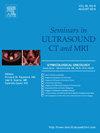PSMA 抗原和磁共振成像在前列腺癌生化复发患者中的作用
IF 1.9
4区 医学
Q3 RADIOLOGY, NUCLEAR MEDICINE & MEDICAL IMAGING
引用次数: 0
摘要
相当一部分男性前列腺癌患者会出现生化复发(BCR),其特点是在接受治愈性治疗后前列腺特异性抗原(PSA)水平升高。影像学检查在 BCR 患者的治疗中发挥着重要作用。它可以帮助确定复发部位,从而确定最合适的治疗策略,从局部复发的挽救治疗到晚期远处疾病的全身治疗。前列腺特异性膜抗原(PSMA)放射配体 PET/CT 是检测前列腺癌复发最灵敏的方法,与骨扫描和计算机断层扫描等传统成像技术相比,即使 PSA 水平较低,其癌症检出率也明显较高。然而,PSMA PET/CT 图像的解读可能具有挑战性,尤其是在评估局部复发时,因为尿液活动可能会模仿或掩盖癌症的存在。此外,有些前列腺癌可能不表达 PSMA,因此会出现假阴性结果。多参数前列腺 MRI 是评估局部复发的绝佳方法,可以克服 PSMA PET/CT 的一些局限性。在这篇综述中,我们讨论了成像在管理前列腺癌 BCR 患者中的作用,并描述了 PSMA-放射配体成像时代 MRI 的潜在优势,重点强调了对局部复发的评估。本文章由计算机程序翻译,如有差异,请以英文原文为准。
The Role of Prostate-Specific Membrane Antigen-Radioligand and Magnetic Resonance Imaging in Patients with Prostate Cancer Biochemical Recurrence
A significant proportion of men with prostate cancer will experience biochemical recurrence (BCR), which is characterized by an elevation in prostate-specific antigen (PSA) levels after receiving treatment with curative intent. Imaging plays an important role in the management of patients with BCR. It can help identify sites of recurrence to determine the most appropriate management strategies, ranging from salvage treatment for local recurrences to systemic treatments for those with advanced, distant disease. PET/CT with prostate-specific membrane antigen (PSMA)-radioligands is the most sensitive method for the detection of prostate cancer recurrence, with significantly higher cancer detection rates compared to conventional imaging techniques such as bone scan and computed tomography, even at lower PSA levels. Nevertheless, interpretation of PSMA PET/CT images can be challenging, particularly for the evaluation of local recurrence due to urinary activity that can mimic or mask the presence of cancer. Furthermore, some prostate cancers may not express PSMA and have false negative results. Multiparametric prostate MRI is an excellent method for the evaluation of local recurrence and can overcome some of the limitations of PSMA PET/CT. In this review, we discuss the role of imaging in managing patients with prostate cancer BCR and describe the potential benefits of MRI in the PSMA-radioligand imaging era, emphasizing the assessment of local recurrence.
求助全文
通过发布文献求助,成功后即可免费获取论文全文。
去求助
来源期刊
CiteScore
2.60
自引率
0.00%
发文量
49
审稿时长
6-12 weeks
期刊介绍:
Seminars in Ultrasound, CT and MRI is directed to all physicians involved in the performance and interpretation of ultrasound, computed tomography, and magnetic resonance imaging procedures. It is a timely source for the publication of new concepts and research findings directly applicable to day-to-day clinical practice. The articles describe the performance of various procedures together with the authors'' approach to problems of interpretation.

 求助内容:
求助内容: 应助结果提醒方式:
应助结果提醒方式:


